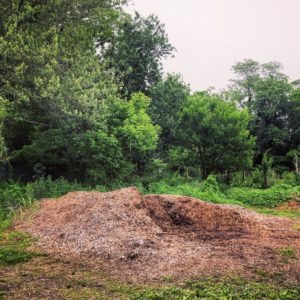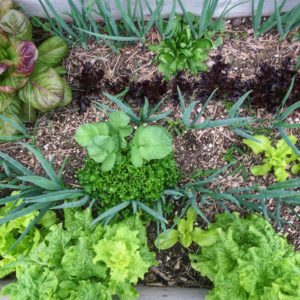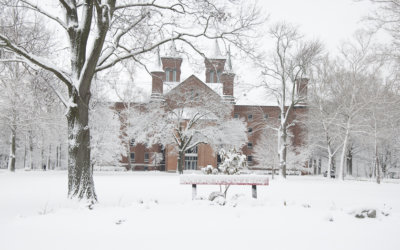As we cultivate the wet earth on the Antioch Farm this season, we are reminded of the importance of resiliency on our farm, especially in light of the excessive and prolific rains of spring. Healthy, resilient soils, rich in organic matter, like those we strive for on the Antioch Farm, can better weather the extremes of our new climate. This is one of the many lessons Antioch students are absorbing on the Farm.
 Students are learning on the Antioch Farm as staff, caring for our chickens before they go to class, or within courses themselves. Students in Ecological Agriculture, taught by Professor Kim Landsbergen, are conducting an experiment with various mulches. The experiment, implemented in the spring, will be concluded with soil tests fall term and determine if one mulch type better improves the soil: alfalfa-grass hay or straw. Results of the experiment could inform Farm decisions and further support our commitment to building healthy soil.
Students are learning on the Antioch Farm as staff, caring for our chickens before they go to class, or within courses themselves. Students in Ecological Agriculture, taught by Professor Kim Landsbergen, are conducting an experiment with various mulches. The experiment, implemented in the spring, will be concluded with soil tests fall term and determine if one mulch type better improves the soil: alfalfa-grass hay or straw. Results of the experiment could inform Farm decisions and further support our commitment to building healthy soil.
New gardens are also popping up on our busy Farm this season. The Antioch Apothecary  Course, taught by Professor Beth Bridgeman, planted an Herbal Apothecary for our sheep, as well as a Native Medicinal Plant Sanctuary within the Food Forest. Medicinal plants from these gardens will be used for animal and human wellness on campus.
Course, taught by Professor Beth Bridgeman, planted an Herbal Apothecary for our sheep, as well as a Native Medicinal Plant Sanctuary within the Food Forest. Medicinal plants from these gardens will be used for animal and human wellness on campus.
Farm 101: Sustainable Apiculture, taught by Professor Amy Osborne, is caring for a honeybee hive located near the new Safe Passage Garden. This garden is a statement of support for violence-free migration for humans and butterflies. It was planted with a variety of milkweeds and dill, host plants for monarch and swallowtail butterfly larva. Butterflies and bees will co-mingle in this pollinator-friendly garden, when not pollinating our vegetable plants or making honey.
The 2019 growing season, though still early, is already a thriving and vibrant place for learning and life in our campus.
Photos courtesy of James Luckett. More of his photographs of the Antioch College Farm are available on Instagram.



